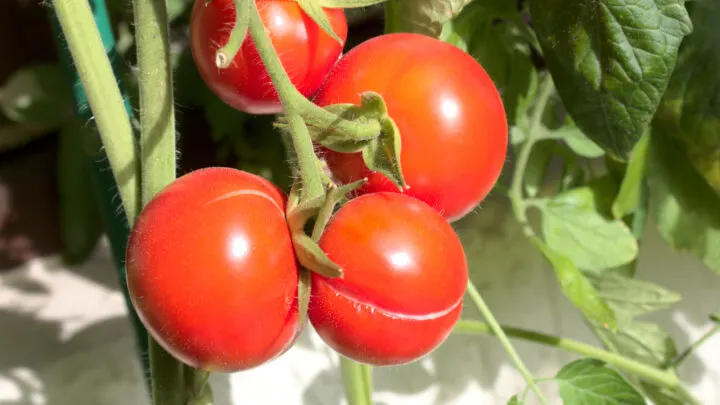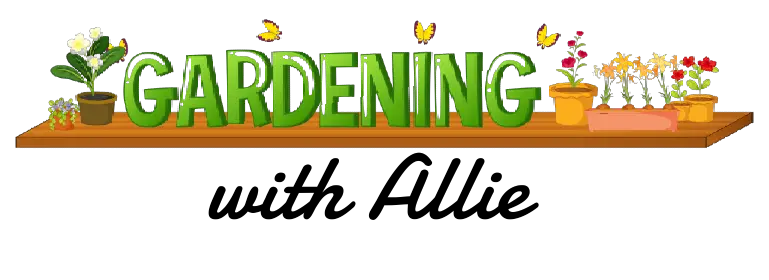Tomatoes are a great addition to any fruit and vegetable garden. Fresh, homegrown tomatoes are typically superior in flavor, texture, and color to what is found in grocery stores and can make a big difference in a homemade meal or as an off-the-vine snack. But you might notice your previously perfect tomatoes have some ruptures now and wonder why are your tomatoes exploding?
The answer is that tomatoes explode from being overwatered or inconsistently watered to the point where the skin bursts, and you now have split or “exploded” tomatoes. This can be due to a sudden rainfall or any sudden influx of water, especially if your plant has gone through periods where its soil has fluctuated between being dry and adequately watered.
Heavy rain can cause this sudden increase in water pressure throughout the fruit, and as the tomatoes ripen, their skins become less tolerant to pressure and can easily rupture or explode.
This is mainly seen in tomatoes about to ripen because the skin is not as resistant to a build-up in pressure from excess water as a green tomato would be, which is relatively hard fully. This disparity in pressure caused your tomato’s skin to rupture and the pulp inside to be exposed.
The risk of exploded tomatoes, or even cracked tomatoes, is that now there is an easy entrance for bacteria or fungi to enter the fruit and cause them to rot. This will ruin a tomato and has the potential for spreading to other tomatoes on the same plant if they have not already fallen victim to the same fate.
Read on to find out more information on this phenomenon and what you can do to prevent it from happening.

How do you keep tomatoes from bursting?
Keeping your tomatoes from bursting involves taking good care of your tomato plants to reduce the chances of a sudden surge of water causing your tomatoes to rupture. This includes regular watering, which keeps your fruits hydrated and plump, making heavy rain less of an issue when it comes to the potential for explosion.
Ensuring you have well-draining soils helps keep excess water from accumulating, and being taken up by your plant is also essential. The best and safest way to ensure your tomatoes don’t burst is by picking them when they are ripe and intact; after a tomato is picked, it will not have the risk of exploding as it would on the vine.
Are split tomatoes okay to eat?
Split or cracked tomatoes can appear unsightly, but there is no reason not to eat them. A split tomato may not have the same texture or taste like a tomato that has effectively ripened and stayed intact, but it is safe to eat as long as there is no mold or infection in your split tomato.
You can also cut the tomato around the cracked or split part and salvage the rest of the fruit. They should be eaten first to avoid further exposure to bacteria or mold spores in the air. If you see signs that your tomatoes are cracking or about to explode, you can remove them from the vine and set them on the counter to finish ripening.

How often should I water my tomatoes?
Like most other fruit and vegetable crops, Tomatoes prefer regular, even watering. This keeps the plant functioning well enough to produce the fruit needed by the grower. Allowing your plant to dry out then giving it a sudden influx of water leads to exploded tomatoes in the first place, so keeping the soil evenly moist is key in growing beautiful, blemish-free tomatoes.
Watering your tomatoes also “trains” them to keep under pressure throughout the fruit. A sudden or unexpected bout of rain does not shock the plant and causes the internal pressure to be greater than what the skin of the tomato can handle.
When your tomatoes start to grow outside, they would like water once a day. Once your plant starts to develop more and the temperatures increase, you might find watering twice a day is needed to keep your plant’s soil from drying out.
Timing when watering matters, too: water your plants early in the morning, before the sun gets too hot, to ensure your plant has sufficient hydration throughout the day to avoid dehydration and even sun damage.
Watering needs will depend on the stage of growth your plant is in and your climate. The hotter the temperatures are, the more water your plant will need. You can tell when your tomato plant needs more water if the soil is dry to the touch.
Another indicator will be drooping leaves. However, if you see drooping leaves accompanied by yellowing or discoloration, this is probably due to overwatering. To avoid overwatering, ensure your plant is in well-draining soil. If you are using a container to grow them, then drainage holes are necessary for your tomato plant’s overall health and longevity.
When should I pick my tomatoes?
Tomatoes should be picked when they are at about an even combination of both red and green in color. This stage is called the “breaker” stage, referring to a first “break” in color coming to the fruit from its under-ripe green color.
They will continue to ripen off the vine, and prevention is the best method to avoid exploding tomatoes. You can also more easily control how quickly your tomato ripens when you remove it off the vine: cooler temperatures, such as temps you’d find in a refrigerator, will slow down the production of the ripening hormone known as ethylene.
Like on a sunny windowsill, warmer temperatures will speed up the ripening process. Additionally, keeping a tomato in the “breaker” stage near some ripe bananas will have the same effect, as bananas also radiate ethylene to the fruits around them.
It takes a sudden, unexpected rain for your previously perfect tomatoes to swell and split. Tomatoes can be left on the vine to ripen, but they will continue to ripen off the vine as well, so you might not get as long of a period between picking your tomatoes and having to eat them. Overall, it does not seem worth the risk to keep your tomatoes on the vine to ripen perfectly when all the hard work and dedication to your plant can be ruined by one quick, heavy rain.
Final Thoughts
After a season of loving cultivation and hard work, it can be frustrating or downright discouraging to have your whole tomato yield ruined by an excess of water which causes your tomatoes to explode.
Fortunately, this can be avoided by keeping your tomato plants regularly watered and by picking your fruits off the vine at that perfect “breaker” stage, which retains the nutrition and flavor quality of your tomato while also mitigating the risk of a last-minute rain flooding your plant with water and thus bursting the fruits. This little bit of foresight can mean all the difference to your yield of tomatoes.

Hi there, my name is Allie and welcome to my blog; GareningWithAllie!
Much of what you see written here is just our personal experiences with gardening. Along with the content I write here, there is also a unique collection of gardening topics covered by some of our close friends. I hope you find everything you read here to be helpful, informative, and something that can make your gardening journey the most lovely experience ever! With that said, Happy Gardening!
